

Laura M. Nickerson
Science Department Chair, Physics and Astronomy Teacher US FIRST Robotics Coach
Constructive & Project-based Learning. BVR STUDIO:PILOT. Curriculum. Design Thinking for Educators. Www.studiobasedlearning.org. How to implement studio teaching? Philosophy Studio teaching is not just another kind of classroom activity.
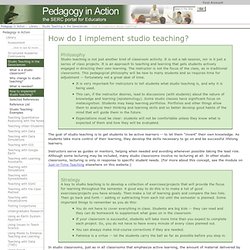
It is not a lab session, nor is it just a series of class projects. It is an approach to teaching and learning that gets students actively engaged in directing their own learning. The instructor is not the focus of the class, as in traditional classrooms. This pedagogical philosophy will be new to many students and so requires time for adjustment -- fortunately not a great deal of time. The goal of studio teaching is to get students to be active learners -- to let them "invent" their own knowledge. Instructors serve as guides or mentors, helping when needed and avoiding whenever possible taking the lead role. Strategy. What Is an Essential Question? What is an essential question?
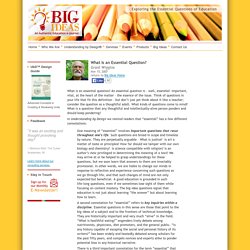
An essential question is – well, essential: important, vital, at the heart of the matter – the essence of the issue. Think of questions in your life that fit this definition – but don’t just yet think about it like a teacher; consider the question as a thoughtful adult. What kinds of questions come to mind? What is a question that any thoughtful and intellectually-alive person ponders and should keep pondering? In Understanding by Design we remind readers that “essential” has a few different connotations: One meaning of “essential” involves important questions that recur throughout one’s life. Skyline CPI. A Complete How-To for Creating Curriculum Sites and Student Portfolios using Google's Tools!
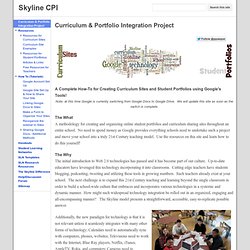
Note: at this time Google is currently switching from Google Docs to Google Drive. We will update this site as soon as the switch is complete. The WhatA methodology for creating and organizing online student portfolios and curriculum sharing sites throughout an entire school. Realizing the Promise of Educational Technology.
Welcome to SEPUP: Science Education for Public Understanding Program. TeachEngineering.org - Free resources for K-12. K-Gray Engineering Pathway Digital Library - Engineering Education Wing of the NSDL. Education - Challenge Based Learning. Project Based Learning. Grand Challenges. Grand Challenges in Global Health. WALC2011. The active learning model is currently utilized in many undergraduate programs throughout the United States and continues to expand at the university level.
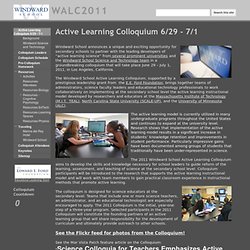
Research shows that implementation of the active learning model results in a significant increase in students’ knowledge retention and improvements in student performance. Particularly impressive gains have been documented among groups of students that traditionally have been under-represented in science. The 2011 Windward School Active Learning Colloquium aims to develop the skills and knowledge necessary for school leaders to guide reform of the learning, assessment, and teaching of science at the secondary school level. Colloquium participants will be introduced to the research that supports the active learning instructional model and will work with team members to gain practical classroom experience in instructional methods that promote active learning. The colloquium is designed for science educators at the secondary level. University - Integrated Science - Overview. Benchmarks Online ~ Project 2061 ~ AAAS. A Framework for K-12 Science Education: Practices, Crosscutting Concepts, and Core Ideas.
Inquiry and the National Science Education Standards: A Guide for Teaching and Learning. National Science Education Standards. 2010 Horizon Report. Download the 2010 Horizon ReportPDF • ePub (also available in other languages) The 2010 Horizon Report is a collaboration betweenThe New Media Consortium and theEDUCAUSE Learning Initiative An EDUCAUSE Program © 2010, The New Media Consortium.
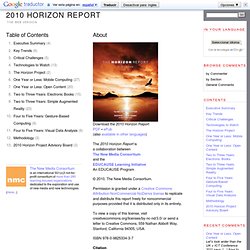
Permission is granted under a Creative Commons Attribution-NonCommercial-NoDerivs license to replicate and distribute this report freely for noncommercial purposes provided that it is distributed only in its entirety. To view a copy of this license, visit creativecommons.org/licenses/by-nc-nd/3.0/ or send a letter to Creative Commons, 559 Nathan Abbott Way, Stanford, California 94305, USA. Citation Johnson, L., Levine, A., Smith, R., & Stone, S. (2010).
Position Statement - Quality Science Education and 21st-Century Skills. Introduction Rapid changes in the world—including technological advancement, scientific innovation, increased globalization, shifting workforce demands, and pressures of economic competitiveness—are redefining the broad skill sets that students need to be adequately prepared to participate in and contribute to today's society (Levy and Murnane 2005; Stewart 2010; Wilmarth 2010).
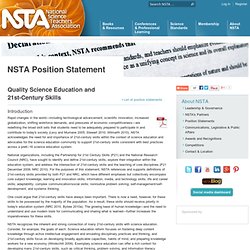
Sir Ken Robinson: Bring on the learning revolution! TEDxKC - Michael Wesch - From Knowledgeable to Knowledge-Able. Richard Baraniuk on open-source learning. Elizabeth Gilbert on nurturing creativity. Ken Robinson says schools kill creativity.
Profile on TED.com. A Vision of Students Today RSA Animate - Drive: The surprising truth about what motivates us. A New Biology for the 21st Century, from Earth and Life Studies. Rb54neal. What Schools Can Learn From Google, IDEO, and Pixar. A community about to build or rehab a school often creates checklists of best practices, looks for furniture that matches its mascot, and orders shiny new lockers to line its corridors.
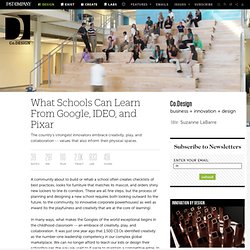
These are all fine steps, but the process of planning and designing a new school requires both looking outward (to the future, to the community, to innovative corporate powerhouses) as well as inward (to the playfulness and creativity that are at the core of learning). In many ways, what makes the Googles of the world exceptional begins in the childhood classroom -- an embrace of creativity, play, and collaboration. It was just one year ago that 1,500 CEOs identified creativity as the number-one leadership competency in our complex global marketplace. We can no longer afford to teach our kids or design their schoolhouses the way we used to if we’re to maintain a competitive edge. [Photos by Steve Hall] The Blue Valley Schools Center for Advanced Professional Studies (BVCAPS) takes a similar approach.